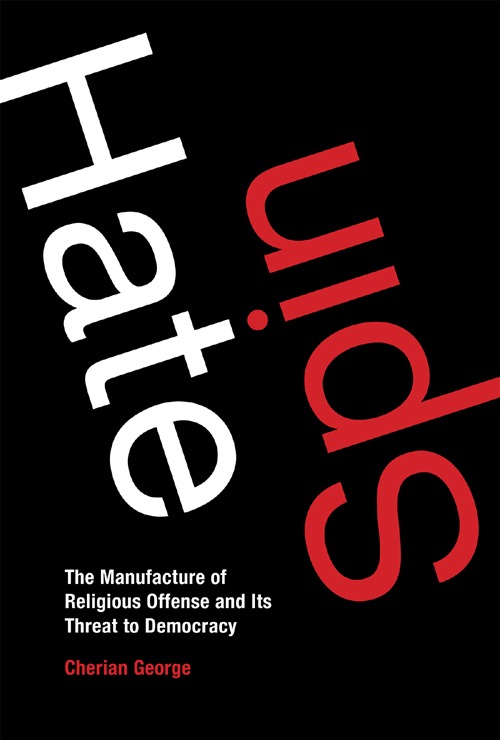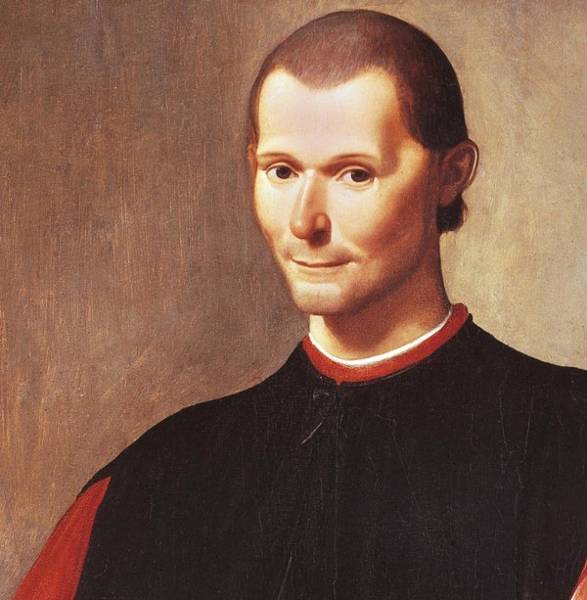
Donald Trump's alarming rhetoric is being broadcast across the world. He seems part of a wider trend of unscrupulous politicians vilifying minorities. Outbreaks of intolerance are usually assumed to be visceral and spontaneous. But in his new book "Hate Spin", Cherian George shows that they often involve sophisticated campaigns manufactured by political opportunists to mobilise supporters and marginalise opponents. George, Associate Professor in the Department of Journalism at Hong Kong Baptist University, calls this strategy “hate spin”—a double-sided technique that combines hate speech with manufactured offence-taking. Here, he discusses his arguments.
Can you explain what you mean by the term “hate spin”?
It’s a term I developed when I realised that the more familiar label, “hate speech”, doesn’t really capture the full range of propaganda methods being used by intolerant groups. As you know, hate speech generally refers to the vilification of some identifiable group, based on its religion, race, immigrant status, sexual orientation and so on. It’s done to incite harms such as discrimination or violence against that group.
But there’s another related strategy that is distinct from conventional hate speech. It’s where political or community leaders whip up a reaction against some perceived insult. They manufacture righteous indignation against a book or video, or a minority community’s plan to build a place of worship. The agitators claim they have to defend their community values from these pollutions. But the real goal is to marginalise their opponents and gain publicity for their cause.
If we think of hate speech as the giving of harmful offence, then this manufactured indignation amounts to strategic offence-taking. Both the giving and taking of offence are powerful instruments of identity politics, and it’s this two-pronged weapon that I call hate spin.
Is this a worldwide phenomenon? You cite examples from a diverse range of countries.
It’s distressingly common. The worst effects are found in non-democracies, or in societies that are transitioning toward democracy but are not there yet. In such countries, vulnerable communities that are targeted by hate spin can’t rely on courts and other institutions to protect their rights. And, without the democratic habits of peaceful dispute resolution, there is a higher chance that hate spin will escalate into hate crimes and mass violence. What’s going on in Myanmar, or Burma, is a classic case. Anti-Muslim rhetoric there is resulting in what some monitors are already calling a genocide.
But hate spin occurs in democracies as well, and my book focuses on the world’s three largest – India, the United States and Indonesia. Democracies know they need to protect freedom of speech, which makes dealing with hate propaganda more conceptually challenging. As a scholar interested in debates about freedom of expression, I wanted to study how democracies balance the right to offend with the right to be protected from discrimination. The short answer is that all democracies are struggling to manage that tension. I think it’s fair to say that genocides would not happen in liberal democracies, but they are certainly not immune to other types of injustice that hate spin fosters.
Is hate spin new, or is it simply a continuation of the type of populist scapegoating of minorities that we have seen for centuries?
Conventional hate speech is definitely ancient. Historians have shown how it’s facilitated the worst crimes that human groups have inflicted on one another – the dehumanising discourse around slavery, for example, or the massacre of indigenous populations by colonists. But the other side of hate spin – manufactured offendedness – may be newer. I’ve not actually tried to study its history. Intuitively, though, it would make sense that it’s a more recent phenomenon. Its appeal draws partly on the modern notion of people power. It makes the twisted democratic claim that if large crowds express loud outrage at some provocative expression, that expression should be suppressed out of respect for popular opinion. In many countries, such campaigns ride on insult laws that basically prohibit the wounding of racial or religious feelings. In British Commonwealth nations like India and Malaysia, these laws are no more than a century old.
Ironically, another reason why offence-taking might be becoming a weapon of choice is that outright hate speech has gotten less and less acceptable in political discourse. Sure, we still find it on online forums, in schools and on the street. But in many countries it’s not acceptable for national politicians to vilify minorities. Think of the support that Donald Trump lost, even from white Americans, when he crossed that line. Smart hate spin agents have discovered that it’s far more effective to mount a campaign of offence-taking, framed in defensive terms – they claim that they are merely trying to protect their community from a grave provocation. That’s much harder for you to counter, because you risk coming across as insensitive to that community’s feelings. It’s especially hard when it involves religion.
Is it usually explicitly religious? Does non-religious hate spin exist?
Certainly, it’s not always religious. In many societies, hate spin is of the racist or xenophobic variety. In East Asia, where I’m based, extreme nationalism is a huge source of intolerance, more than religion. From the perspective of a political mobiliser, any marker of identity has potential if it can be exploited to draw a line between “us” and “them”. Religious hate spin is, of course, one of the most potent kinds, because you are harnessing symbols laden with perceived divine authority.
I’m not suggesting that organised religion, as such, is the problem; or that particular religions are inherently incompatible with the project of building open and tolerant democracies. What’s dangerous are religious tendencies that push for more exclusive definitions of nationhood. It’s fine to admit religious values and forms of expression into a competitive public sphere, but it’s disastrous when that access and respect is seen as the privilege of just one religious community at the expense of other faiths and non-believers.
In the UK and other European countries, “human rights” are increasingly spoken about with disdain. Is there a risk to free speech in democratic societies?
It does look as if the idea of democracy and human rights are on the defensive worldwide. It’s quite different from the 1990s, during the post-Soviet euphoria, when the West was more palpably championing these values and exercising moral leadership. Clearly, terrorism has succeeded in elevating order over liberty as a priority. And I suppose some people become more cautious about individual rights when they see those rights being claimed by those who seem too culturally different. Freedom of religion and belief was fine as long as it was applied to various Christian sects, but when immigrant Muslims claim the same right, there’s less enthusiasm.
However, Europe’s democratic foundations are probably strong enough to survive this rough season. What’s more worrying is that the West, because of its internal turmoil, is unable right now to exercise moral leadership around the world. The amount of bad behaviour by governments and non-state actors worldwide is alarming. The rogues are hiding behind one another. And the mind-numbing atrocities of the Islamic State have meant that the world has less time for other humanitarian emergencies, like what is happening in Myanmar. Victims of discrimination and hate find it harder to get international attention when they are not being spectacularly beheaded or massacred by the thousands. So hate spin agents get away with their divisive and destructive methods.
“Us vs them” is a persuasively simple narrative. How can it best be countered?
Yes, it’s precisely because it is such an easy sell that it’s an irresistible technique for unscrupulous political actors like Donald Trump. There is no easy solution. The counter-narrative doesn’t have the same simplicity. It is ultimately about how we all have multiple, overlapping identities rather than singular, exclusive ones.
Hate spin relies on instincts that are as old as human community: find solidarity and security with your in-group, and protect yourself against out-groups. In contrast, the counter-hate ethos that we now need is very new to human civilisation. It’s about the duties and obligations we owe even to strangers, on account of our shared humanity. It’s about respecting difference. This is the human rights perspective. It’s enshrined in international treaties and the United Nations Charter, but it will be a long time before it is embraced by most people as a commonsensically good thing.
Redefining our identities is one of the main challenges of our time, because the world is not getting any less crowded or diverse. For those of us who understand this, the onus is on us to work a lot harder at countering hate, and selling a more cosmopolitan vision. The law has a role. Not so much in policing speech; but more in combating discrimination. Vigorously protecting equal rights will do more for vulnerable groups than punishing offensive expression against them. To counter hate propaganda, governments can use their own speech, and of course other influencers also have a big role to play – journalists, artists, intellectuals, civil society, and religious leaders.

